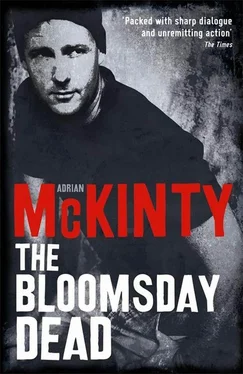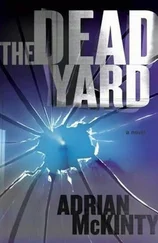Adrian McKinty - The Bloomsday Dead
Здесь есть возможность читать онлайн «Adrian McKinty - The Bloomsday Dead» весь текст электронной книги совершенно бесплатно (целиком полную версию без сокращений). В некоторых случаях можно слушать аудио, скачать через торрент в формате fb2 и присутствует краткое содержание. Жанр: Триллер, на английском языке. Описание произведения, (предисловие) а так же отзывы посетителей доступны на портале библиотеки ЛибКат.
- Название:The Bloomsday Dead
- Автор:
- Жанр:
- Год:неизвестен
- ISBN:нет данных
- Рейтинг книги:3 / 5. Голосов: 1
-
Избранное:Добавить в избранное
- Отзывы:
-
Ваша оценка:
- 60
- 1
- 2
- 3
- 4
- 5
The Bloomsday Dead: краткое содержание, описание и аннотация
Предлагаем к чтению аннотацию, описание, краткое содержание или предисловие (зависит от того, что написал сам автор книги «The Bloomsday Dead»). Если вы не нашли необходимую информацию о книге — напишите в комментариях, мы постараемся отыскать её.
The Bloomsday Dead — читать онлайн бесплатно полную книгу (весь текст) целиком
Ниже представлен текст книги, разбитый по страницам. Система сохранения места последней прочитанной страницы, позволяет с удобством читать онлайн бесплатно книгу «The Bloomsday Dead», без необходимости каждый раз заново искать на чём Вы остановились. Поставьте закладку, и сможете в любой момент перейти на страницу, на которой закончили чтение.
Интервал:
Закладка:
“You’ll give who?”
“I’ll give you personally.”
“Fair enough. I’ll see what I can do, hold on there.”
I took a seat in the corridor and closed the door on the two peelers watching the German porn flick.
The keen copper came back.
“Slider McFerrin?” he asked.
“Aye.”
“James McFerrin, lives with his ma at 6 Kilroot View Road, Bangor. You think he’s mixed up in this?”
“He might be.”
“Well, he’s a player all right.”
“What can you tell me?
“I can’t tell you anything. Watch your step, though. Bad family. He’s one of six boys. Eldest was killed by his own side, the ma runs bootleg whiskey, and he’s done time in the Maze for murder, assault, and grievous bodily harm. He was released under the Good Friday Agreement. Nothing about theft, phones or otherwise, but he’s a bad ’un.”
“Cheers, mate.”
I walked out into the station car park. It was raining again now. The drains had been blocked up and narrowed to tiny slits so that a terrorist couldn’t crawl into the sewers and blow the police station up from underneath. The car park was flooding and a peeler with a foot pump was trying to get the water out of the bigger potholes. It was a sorry sight.
“You couldn’t give us a hand there?” the peeler asked, mistaking me for a plainclothes detective.
“Fuck, no,” I told him.
I left the cop shop, walked a few blocks, found a taxi stand outside the Ulster Hall. They were just letting out a revival preacher, a Dr. McCoy from the Bob Jones ministry in America. Revival meetings were popular in Belfast. From the airbrushing on his poster, Dr. McCoy seemed a wee bit more suspicious than most, and sure enough, the patrons had been so thoroughly fleeced that no one even had any dough left for a taxi. I skipped to the front of the line.
The driver of the black cab was glad to see me.
“Hanging about here for bloody ten minutes,” he complained. “I suppose the rest of your mates are waiting to get beamed up.”
I got the joke, told him the address in Bangor.
“I see you’re wearing a Zeppelin T-shirt. Did you know that the Ulster Hall was the very place where Zep played ‘Stairway to Heaven’ for the first time?”
I said I didn’t know, but there was an extra fifty quid in it if he shut up and another fifty if he drove to Bangor like the hounds of hell were after him.

A wind from the Arctic taking the black smoke from Kilroot Power Station and blowing it down over the bad facsimiles of houses in the dour northern part of Bangor. The shore and the oily sea slinking back into themselves and the smell of burning permeating everything. Ash on clotheslines and whitewashed walls and on almost all the wind-ward-facing surfaces, as if the golden head of the enormous belching chimney top was in some sinister coitus with the dank and cheerless settlement.
Kids out playing football, older folks sitting in deck chairs, chatting. It was a break in the rain, and in Northern Ireland you used those breaks when you could get them.
The people were Protestants. I knew this not because they were physically unlike or dressed differently from Catholics-indeed, anyone who says that he can tell a Catholic Irishman from a Protestant Irishman by looking at him is a liar, since a third of all marriages in Ulster are across the sectarian divide. Nah, I knew it because the curbstones had been painted red, white, and blue, there were murals of King Billy at the ends of the street, there was a painted memorial for the battle of the Somme on the side of a house, and the flags flying in this neighborhood were the Scottish saltaire, Old Glory, the Union Jack, the Ulster flag, and the Israeli Star of David. If there were Catholics on this street, they kept bloody quiet about it.
I knocked on the door of number six.
A kid answered. About ten, freckles, brown hair, patched sweater, cheeky looking.
“What do you want?” he asked.
“I’m looking for Slider.”
“He’s away,” the kid said.
“Where is he?”
“Don’t know.”
“Who does know?”
“Ma.”
“Is she home?”
“She’ll be back in five minutes. Down the shops. Do you want to wait inside?”
“Well, are you sure that would be ok?”
“Aye. It’s fine.”
I followed the kid inside the council house.
A broken light and a narrow hall filled with a death-trap assortment of toys: skateboards, roller skates, cricket balls. The kid opened a door to the left and I followed him into the living room. Boards on the floor, bare walls, and some kind of grotesque papier-mâché statue in the middle of the room. Another kid, a little younger than the first, adding more wet paper to the statue.
“What in the name of God is that?” I asked.
“It’s the fucking pope, what do you think?” the first kid said.
I looked again. The Holy Father’s head was lying on some old plywood and empty vodka boxes. It was still crude, with black-marker facial hair and possessing only a hastily drawn lopsided grin, instead of the full black-toothed variety that would frighten even the youngest children. Just over six feet high and draped in a white sheet, it looked more like a Klansman than the leader of the Catholic Church.
“Do you not think it’s any good?” the younger kid asked.
“What are your names?” I asked the first.
“I’m Steven, he’s Monkey,” the first kid said.
“You’re telling me that that’s supposed to be the pope?” I asked Steven, looking at my watch.
“Aye, it is.”
“What’s it for?”
“Are you not from around here?” Steven asked.
And then I remembered. Of course. The Twelfth of July was coming up. The anniversary of the Battle of the Boyne, when Protestant King William defeated Catholic King James, a victory celebrated every year by burning the pope in effigy.
The kid looked at me for an answer.
“No, I’m not from around here.”
I lit a cigarette and sat down on a ripped leather sofa. The kids demanded a share and so I lit a couple more.
“Well, what you think of the pope?” Steven asked, smoking expertly.
What I thought was that that was the whole problem with Protestant ideology in Northern Ireland. They had gotten it all wrong-the way to really preserve a culture was to celebrate and nurture the memory of a glorious defeat, not a famous victory. That’s why Gallipoli, Gettysburg, the Field of Blackbirds, the Alamo became the foundation myths for the Kiwis, the American South, Serbs, and Texas. Every year the Shi’a celebrate a massacre and, of course, Christianity is founded upon an execution.
“The pope doesn’t have a beard,” I said.
“See,” Steven told Monkey, shaking his head dramatically and dropping the ash from his cigarette onto the bare floor.
“What exactly are you saying, wee lad?” Monkey said.
“I told ya,” Steven said with satisfaction.
Monkey’s face went through a spasm.
“You told me he had a beard like Jesus in The Passion.”
“I did not,” Steven replied indignantly.
“Did so,” Monkey said, clenching his fists.
“Not.”
They had both forgotten I was there. They were about to come to blows and even if they didn’t, they were giving me a bloody headache.
“Ok, lads, give it a rest. Steven, here’s a fiver, away you go and find your ma for me,” I said.
The kid took the note and sprinted out into the street. The other wean looked at me suspiciously, puffed on his cigarette, and went back to his work.
“Are you from America?” he asked after a while.
“Aye, now I am,” I said.
“What’s it like out there?” he asked wistfully.
Читать дальшеИнтервал:
Закладка:
Похожие книги на «The Bloomsday Dead»
Представляем Вашему вниманию похожие книги на «The Bloomsday Dead» списком для выбора. Мы отобрали схожую по названию и смыслу литературу в надежде предоставить читателям больше вариантов отыскать новые, интересные, ещё непрочитанные произведения.
Обсуждение, отзывы о книге «The Bloomsday Dead» и просто собственные мнения читателей. Оставьте ваши комментарии, напишите, что Вы думаете о произведении, его смысле или главных героях. Укажите что конкретно понравилось, а что нет, и почему Вы так считаете.










